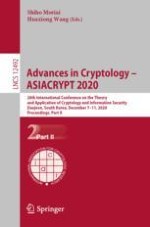2020 | OriginalPaper | Buchkapitel
Oblivious Pseudorandom Functions from Isogenies
verfasst von : Dan Boneh, Dmitry Kogan, Katharine Woo
Erschienen in: Advances in Cryptology – ASIACRYPT 2020
Aktivieren Sie unsere intelligente Suche, um passende Fachinhalte oder Patente zu finden.
Wählen Sie Textabschnitte aus um mit Künstlicher Intelligenz passenden Patente zu finden. powered by
Markieren Sie Textabschnitte, um KI-gestützt weitere passende Inhalte zu finden. powered by
